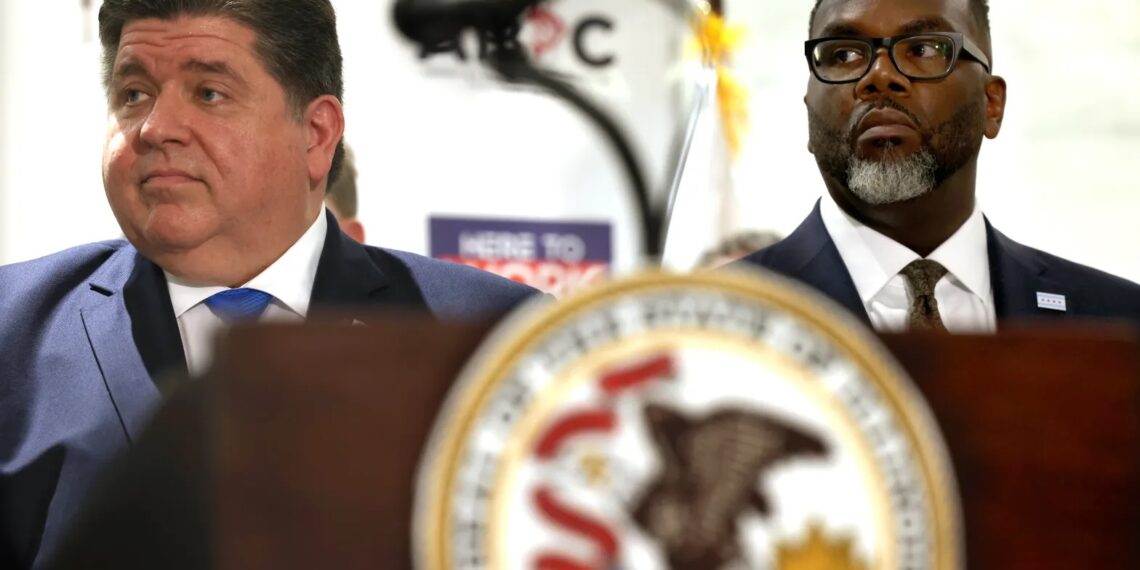By Illinois Review
Chicago’s sanctuary policies are under fire after reports revealed that police officers were ordered to “stand down” and not assist a federal Immigration and Customs Enforcement (ICE) agent surrounded by a hostile crowd in Brighton Park.
What began as a dangerous breakdown in communication may now spiral into a full-scale legal crisis for both Mayor Brandon Johnson and Governor JB Pritzker.
Radio transmissions obtained by CWB Chicago captured multiple Chicago Police Department (CPD) officers asking for guidance after an ICE agent called for emergency assistance. “They were saying that they were being surrounded… we’re not sending?” one dispatcher asked. The chilling reply came: “Per the Chief of Patrol, all CPD resources are clear from the scene.” That order, allegedly issued under the direction of city leadership, meant a federal officer was left to face the threat alone.
Legal experts say both Mayor Johnson and Gov. Pritzker may have created or reinforced a policy environment that unlawfully interfered with federal law enforcement operations and endangered lives. Their sanctuary directives – each designed to block cooperation with ICE – could now serve as evidence in potential civil or criminal investigations.
In August 2025, Johnson signed an executive order barring Chicago police from cooperating with federal immigration enforcement. Gov. Pritzker had already signed statewide sanctuary laws restricting local police from assisting ICE operations and prohibiting the sharing of information about immigration status.
Together, those policies established what critics call a “don’t help” culture across Illinois law enforcement.
Under Illinois law, every law enforcement officer has a legal duty to render aid as soon as reasonably possible when someone is injured or in danger (720 ILCS 5/7-15). That duty applies to all persons – including federal officers. A command to “stand down” in the face of an active threat is a direct violation of that obligation and could constitute official misconduct under state statute (720 ILCS 5/33-3).
Both the supervisor who issued the order and those responsible for the policy behind it could face liability.
At the federal level, the exposure is even greater.
Under the Civil Rights Act (42 U.S.C. § 1983), any government official who, acting “under color of law,” causes another person to be deprived of constitutional protections can be sued. A stranded ICE officer could claim that Johnson’s and Pritzker’s sanctuary policies were the “moving force” behind his deprivation of rights. Federal prosecutors could also examine potential violations of 18 U.S.C. § 241 (conspiracy against rights) and § 242 (deprivation of rights under color of law), which criminalize willful obstruction or endangerment by public officials.
Gov. Pritzker, who has long positioned Illinois as a “sanctuary state,” is also facing renewed scrutiny. His 2021 executive order and subsequent legislation prohibit local police from assisting ICE and sharing data with federal authorities. Critics argue those directives created confusion and tension between state and federal agencies. If investigators find that Pritzker’s policies contributed to the lack of response in Brighton Park, he too could face civil litigation or even federal investigation for interference with federal duties.
Republican lawmakers in Washington could call for a joint federal investigation into whether state and city sanctuary directives unlawfully interfered with ICE operations. If the evidence confirms that the mayor’s or governor’s policies prevented Chicago police from responding to an officer in distress, both leaders could face serious legal repercussions under state and federal law.
The law is clear: neither a city executive order nor a state sanctuary statute can override the duty to protect life. If Brandon Johnson’s and JB Pritzker’s political agendas left a federal officer defenseless, the consequences may not stop at public outrage – they could end in court.









